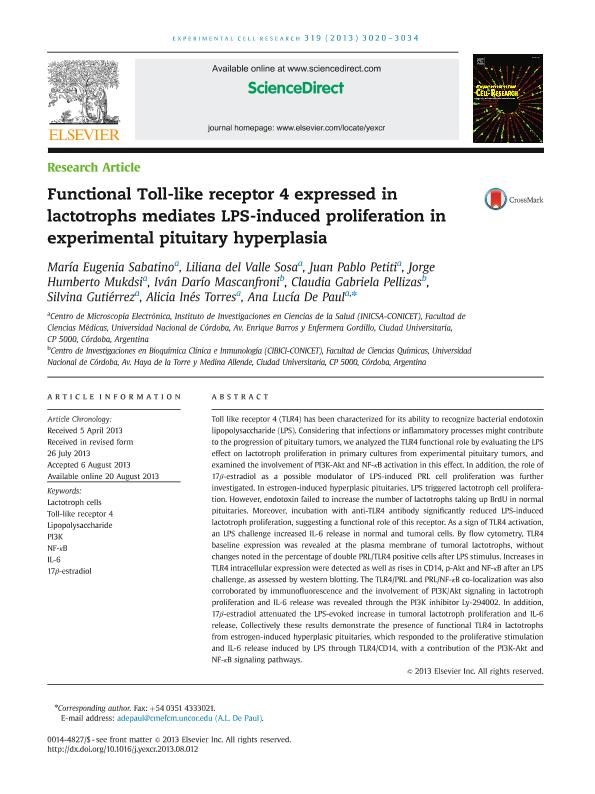Mostrar el registro sencillo del ítem
dc.contributor.author
Sabatino, María Eugenia

dc.contributor.author
Sosa, Liliana del Valle

dc.contributor.author
Petiti, Juan Pablo

dc.contributor.author
Mukdsi, Jorge Humberto

dc.contributor.author
Mascanfroni, Ivan Darío

dc.contributor.author
Pellizas, Claudia Gabriela

dc.contributor.author
Torres, Alicia Ines

dc.contributor.author
de Paul, Ana Lucia

dc.date.available
2021-06-15T18:33:49Z
dc.date.issued
2013-11
dc.identifier.citation
Sabatino, María Eugenia; Sosa, Liliana del Valle; Petiti, Juan Pablo; Mukdsi, Jorge Humberto; Mascanfroni, Ivan Darío; et al.; Functional Toll-like receptor 4 expressed in lactotrophs mediates LPS-induced proliferation in experimental pituitary hyperplasia; Elsevier Inc; Experimental Cell Research; 319; 19; 11-2013; 3020-3034
dc.identifier.issn
0014-4827
dc.identifier.uri
http://hdl.handle.net/11336/133921
dc.description.abstract
Toll like receptor 4 (TLR4) has been characterized for its ability to recognize bacterial endotoxin lipopolysaccharide (LPS). Considering that infections or inflammatory processes might contribute to the progression of pituitary tumors, we analyzed the TLR4 functional role by evaluating the LPS effect on lactotroph proliferation in primary cultures from experimental pituitary tumors, and examined the involvement of PI3K-Akt and NF-κB activation in this effect. In addition, the role of 17. β-estradiol as a possible modulator of LPS-induced PRL cell proliferation was further investigated. In estrogen-induced hyperplasic pituitaries, LPS triggered lactotroph cell proliferation. However, endotoxin failed to increase the number of lactotrophs taking up BrdU in normal pituitaries. Moreover, incubation with anti-TLR4 antibody significantly reduced LPS-induced lactotroph proliferation, suggesting a functional role of this receptor. As a sign of TLR4 activation, an LPS challenge increased IL-6 release in normal and tumoral cells. By flow cytometry, TLR4 baseline expression was revealed at the plasma membrane of tumoral lactotrophs, without changes noted in the percentage of double PRL/TLR4 positive cells after LPS stimulus. Increases in TLR4 intracellular expression were detected as well as rises in CD14, p-Akt and NF-κB after an LPS challenge, as assessed by western blotting. The TLR4/PRL and PRL/NF-κB co-localization was also corroborated by immunofluorescence and the involvement of PI3K/Akt signaling in lactotroph proliferation and IL-6 release was revealed through the PI3K inhibitor Ly-294002. In addition, 17. β-estradiol attenuated the LPS-evoked increase in tumoral lactotroph proliferation and IL-6 release. Collectively these results demonstrate the presence of functional TLR4 in lactotrophs from estrogen-induced hyperplasic pituitaries, which responded to the proliferative stimulation and IL-6 release induced by LPS through TLR4/CD14, with a contribution of the PI3K-Akt and NF-κB signaling pathways. © 2013 Elsevier Inc.
dc.format
application/pdf
dc.language.iso
eng
dc.publisher
Elsevier Inc

dc.rights
info:eu-repo/semantics/openAccess
dc.rights.uri
https://creativecommons.org/licenses/by-nc-sa/2.5/ar/
dc.subject
17Β-ESTRADIOL
dc.subject
IL-6
dc.subject
LACTOTROPH CELLS
dc.subject
LIPOPOLYSACCHARIDE
dc.subject
NF-ΚB
dc.subject
PI3K
dc.subject
TOLL-LIKE RECEPTOR 4
dc.subject.classification
Otras Medicina Básica

dc.subject.classification
Medicina Básica

dc.subject.classification
CIENCIAS MÉDICAS Y DE LA SALUD

dc.title
Functional Toll-like receptor 4 expressed in lactotrophs mediates LPS-induced proliferation in experimental pituitary hyperplasia
dc.type
info:eu-repo/semantics/article
dc.type
info:ar-repo/semantics/artículo
dc.type
info:eu-repo/semantics/publishedVersion
dc.date.updated
2021-04-23T18:34:58Z
dc.journal.volume
319
dc.journal.number
19
dc.journal.pagination
3020-3034
dc.journal.pais
Países Bajos

dc.journal.ciudad
Amsterdam
dc.description.fil
Fil: Sabatino, María Eugenia. Consejo Nacional de Investigaciones Científicas y Técnicas. Centro Científico Tecnológico Conicet - Córdoba. Instituto de Investigaciones en Ciencias de la Salud. Universidad Nacional de Córdoba. Instituto de Investigaciones en Ciencias de la Salud; Argentina
dc.description.fil
Fil: Sosa, Liliana del Valle. Consejo Nacional de Investigaciones Científicas y Técnicas. Centro Científico Tecnológico Conicet - Córdoba. Instituto de Investigaciones en Ciencias de la Salud. Universidad Nacional de Córdoba. Instituto de Investigaciones en Ciencias de la Salud; Argentina
dc.description.fil
Fil: Petiti, Juan Pablo. Consejo Nacional de Investigaciones Científicas y Técnicas. Centro Científico Tecnológico Conicet - Córdoba. Instituto de Investigaciones en Ciencias de la Salud. Universidad Nacional de Córdoba. Instituto de Investigaciones en Ciencias de la Salud; Argentina
dc.description.fil
Fil: Mukdsi, Jorge Humberto. Consejo Nacional de Investigaciones Científicas y Técnicas. Centro Científico Tecnológico Conicet - Córdoba. Instituto de Investigaciones en Ciencias de la Salud. Universidad Nacional de Córdoba. Instituto de Investigaciones en Ciencias de la Salud; Argentina
dc.description.fil
Fil: Mascanfroni, Ivan Darío. Consejo Nacional de Investigaciones Científicas y Técnicas. Centro Científico Tecnológico Córdoba. Centro de Investigaciones en Bioquímica Clínica e Inmunología; Argentina
dc.description.fil
Fil: Pellizas, Claudia Gabriela. Consejo Nacional de Investigaciones Científicas y Técnicas. Centro Científico Tecnológico Córdoba. Centro de Investigaciones en Bioquímica Clínica e Inmunología; Argentina
dc.description.fil
Fil: Torres, Alicia Ines. Consejo Nacional de Investigaciones Científicas y Técnicas. Centro Científico Tecnológico Conicet - Córdoba. Instituto de Investigaciones en Ciencias de la Salud. Universidad Nacional de Córdoba. Instituto de Investigaciones en Ciencias de la Salud; Argentina
dc.description.fil
Fil: de Paul, Ana Lucia. Consejo Nacional de Investigaciones Científicas y Técnicas. Centro Científico Tecnológico Conicet - Córdoba. Instituto de Investigaciones en Ciencias de la Salud. Universidad Nacional de Córdoba. Instituto de Investigaciones en Ciencias de la Salud; Argentina
dc.journal.title
Experimental Cell Research

dc.relation.alternativeid
info:eu-repo/semantics/altIdentifier/url/http://www.sciencedirect.com/science/article/pii/S001448271300342X
dc.relation.alternativeid
info:eu-repo/semantics/altIdentifier/doi/https://doi.org/10.1016/j.yexcr.2013.08.012
Archivos asociados
